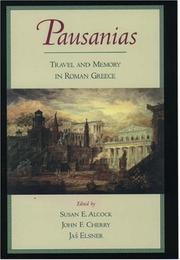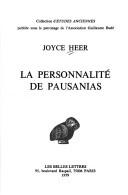| Listing 1 - 10 of 13 | << page >> |
Sort by
|
Book
ISBN: 2821829086 2960071735 Year: 2013 Publisher: Liège : Presses universitaires de Liège,
Abstract | Keywords | Export | Availability | Bookmark
 Loading...
Loading...Choose an application
- Reference Manager
- EndNote
- RefWorks (Direct export to RefWorks)
Le voyage de Grèce entrepris par Pausanias au IIe siècle de notre ère est une expérience concrète qui fait de chaque lieu parcouru, de chaque monument croisé, lorsqu’ils sont choisis à cette fin, une parcelle de l’identité grecque. Le système religieux dont le visiteur rend partiellement compte, en assumant fermement ses choix, est un ensemble de comportements et de représentations imbriqués dans tous les aspects de la vie des Grecs. Dès lors, le voyage à la source de la culture grecque dont témoigne la Périégèse se trouve continument alimenté par un tel matériau. En marchant sur les traces de Pausanias, les historiens de la religion grecque, à leur tour, collectent des fragments de cette vie religieuse en érigeant son œuvre en source de leur enquête. Mais ils sont tributaires des choix qui ont été opérés il y a presque deux millénaires par cet érudit venu d’Asie Mineure. Tenir compte de ces choix et replacer les données dans l’ensemble de l’œuvre qui les porte sont deux impératifs essentiels qu’analyse ce « Retour à la source ».
Pausanias, --- Criticism and interpretation. --- Greece --- Religion. --- Pausanias --- Pausanias Periegeta --- Pausania, --- Pavsanīĭ, --- Pavzaniĭ, --- Παυσανίας, --- Religion --- History --- religion grecque antique --- sacrifice --- divinités grecques antiques --- mystères
Book
ISBN: 8871231198 9788871231198 Year: 1990 Volume: 14 13 Publisher: Padova Ed. Programma
Abstract | Keywords | Export | Availability | Bookmark
 Loading...
Loading...Choose an application
- Reference Manager
- EndNote
- RefWorks (Direct export to RefWorks)
Democracy --- Philosophy --- Pausânias --- Greece --- Historiography --- -Self-government --- Political science --- Equality --- Representative government and representation --- Republics --- Pausanias. --- Pestana, César A. --- Historiography. --- -Philosophy --- Pausanias Periegeta --- Pausanias, --- Democracy - Philosophy --- Greece - Historiography

ISBN: 9155403697 9789155403690 Year: 1976 Volume: 9 Publisher: Stockholm Almqvist och Wiksell
Abstract | Keywords | Export | Availability | Bookmark
 Loading...
Loading...Choose an application
- Reference Manager
- EndNote
- RefWorks (Direct export to RefWorks)
Pausanias --- -Style --- Pestana, César A. --- Language. --- Pausanias, --- Literary style. --- Language --- Literary style --- Pausanias Periegeta --- Pausania, --- Pavsanīĭ, --- Pavzaniĭ, --- Παυσανίας, --- Pausanias, - active approximately 150-175 - Language --- Pausanias, - active approximately 150-175 - Literary style --- Pausanias, - active approximately 150-175
Book
ISBN: 0520053982 9780520053984 Year: 1985 Volume: 50 Publisher: Berkeley (CA) : University of California Press,
Abstract | Keywords | Export | Availability | Bookmark
 Loading...
Loading...Choose an application
- Reference Manager
- EndNote
- RefWorks (Direct export to RefWorks)
Pausanias, --- Greece --- Grèce --- Description and travel --- Antiquities --- Descriptions et voyages --- Antiquités --- Pausanias. --- Pestana, César A. --- Antiquities. --- Description and travel. --- Description, geography --- Pausanias Periegeta --- Grèce --- Antiquités --- Pausanias, géographe. Description de la Grèce. --- Pausanias de Periëgeet. Rondleiding door Griekenland. --- Pausanias, - active approximately 150-175 - Description of Greece --- Greece - Description and travel --- Greece - Antiquities

ISBN: 0195128168 9780195128161 Year: 2001 Publisher: Oxford [etc.] : Oxford University Press,
Abstract | Keywords | Export | Availability | Bookmark
 Loading...
Loading...Choose an application
- Reference Manager
- EndNote
- RefWorks (Direct export to RefWorks)
Pausanias, --- Greece --- Description and travel --- Antiquities --- Pausanias. --- Pausanias Periegeta --- Greece. --- Antiquities. --- Description and travel. --- Description, geography --- Grèce --- Early works to 1800 --- Historiography --- Descriptions et voyages --- Ouvrages avant 1800 --- Antiquités --- Historiographie --- Pausanias --- Early works to 1800. --- Pausanias, - fl. ca. 150-175. - Description of Greece --- Greece - Description and travel --- Greece - Antiquities --- Greece - Historiography
Book
ISBN: 1282187651 9786612187650 3110216566 9783110216561 9783110206890 3110206897 Year: 2009 Publisher: Berlin : De Gruyter,
Abstract | Keywords | Export | Availability | Bookmark
 Loading...
Loading...Choose an application
- Reference Manager
- EndNote
- RefWorks (Direct export to RefWorks)
Die Studie wählt einen neuen Forschungsansatz, der von der Prämisse ausgeht, dass es sich in der Periegese des Pausanias um kaschiertes Städtelob (beziehungsweise Städtetadel) handelt. Die Autorin weist zur Begründung auf eine gezielte "Verrätselung" der Periegese hin, die sie vor allem aus dem gattungsuntypischen Anfang und Schluss des Werks ableitet. Zentrales Kriterium der Städtewertungen ist die Religion, ein politischer Zusammenhang, der seit dem Hellenismus Tradition hat. Die zum Teil bisher ungeklärten Strukturen des Werks, wie die Lückenhaftigkeit oder der kompilative Charakter der Periegese, führt Frateantonio auf verschiedene rhetorische Beschreibungsprinzipien zurück, die sie in ihrem Verhältnis zum kulturellen Kontext der Zweiten Sophistik untersucht. Das dominante Vorbild des Pausanias sieht die Autorin in dem hellenistischen Historiker Polemon von Ilion.
Greek Religion. --- Griechische Religion. --- Pausanias. --- Second Sophistic. --- Zweite Sophistik. --- Vergleich --- Stadt --- Religiöse Identität --- HISTORY / Ancient / Greece. --- Religiöses Bewusstsein --- Identität --- Stadtgebiet --- Städte --- Gemeinde --- Vergleichen --- Vergleichung --- Pausanias, --- Greece --- History. --- Description and travel. --- Description, geography --- Description and travel --- Pausanias --- Pausanias Periegeta --- Pausania, --- Pavsanīĭ, --- Pavzaniĭ, --- Παυσανίας, --- Religion. --- Graeciae descriptio. --- Religiöses Bewusstsein --- Identität --- Städte

ISBN: 2251325433 9782251325439 Year: 1979 Publisher: Paris Belles Lettres
Abstract | Keywords | Export | Availability | Bookmark
 Loading...
Loading...Choose an application
- Reference Manager
- EndNote
- RefWorks (Direct export to RefWorks)
Pausanias --- Pausanias, --- Greece --- Grèce --- Historiography --- Description and travel --- Antiquities --- Historiographie --- Descriptions et voyages --- Antiquités --- Knowledge --- Pestana, César A. --- -Greece. --- Antiquities. --- Description and travel. --- Historiography. --- Description, geography --- Pausanias Periegeta --- Grèce --- Antiquités --- Pausania, --- Pavsanīĭ, --- Pavzaniĭ, --- Παυσανίας, --- Greece. --- Pausanias - Knowledge - Greece --- Greece - Antiquities --- Greece - Description and travel --- Greece - Historiography --- Pausanias, voyageur et geographe grec du 2e siecle --- Litterature grecque --- Histoire religieuse ancienne --- Grece antique --- Histoire religieuse
Book
ISBN: 9782960071733 2960071735 Year: 2008 Volume: 20 Publisher: Liège Centre international d'étude de la religion grecque antique
Abstract | Keywords | Export | Availability | Bookmark
 Loading...
Loading...Choose an application
- Reference Manager
- EndNote
- RefWorks (Direct export to RefWorks)
Sacrifice --- Mythology, Greek --- Rites and ceremonies --- Mythologie grecque --- Rites et cérémonies --- History --- Histoire --- Greece --- Grèce --- Religion --- Pausanias, --- Criticism and interpretation --- Rites et cérémonies --- Grèce --- Pausania, --- Pavsanīĭ, --- Pavzaniĭ, --- Παυσανίας, --- Criticism and interpretation. --- Religion. --- History. --- Pausanias --- Pausanias Periegeta --- Grèce - Religion --- Pausanias, - active approximately 150-175 - Criticism and interpretation --- Greece - Religion --- Pausanias, - active approximately 150-175 --- Pausanias (01..-01..). description de la grèce --- Religion grecque
Book
ISBN: 9780199672776 0199672776 1306907454 019883103X 0191775258 0191653403 9780191653407 9780198831037 Year: 2014 Publisher: Oxford Oxford university press
Abstract | Keywords | Export | Availability | Bookmark
 Loading...
Loading...Choose an application
- Reference Manager
- EndNote
- RefWorks (Direct export to RefWorks)
The Greek myths are characteristically fabulous; they are full of monsters, metamorphoses, and the supernatural. However, they could be told in other ways as well. This volume charts ancient dissatisfaction with the excesses of myth, and the various attempts to cut these stories down to size by explaining them as misunderstood accounts of actual events.
Greek literature --- Griechisch. --- Literatur. --- Mythos. --- Rezeption. --- Rationalität. --- Greek literature. --- History and criticism. --- History and criticism --- Paléphatos --- Criticism and interpretation --- Conon --- Plutarch --- Pausanias --- Heraclitus --- Mythology [Greek ] in literature --- Myth --- Demythologization --- God --- Gods --- Mythology --- Religion --- History. --- Palaephatus --- Conon, --- Pausanias, --- Pausanias Periegeta --- Pausania, --- Pavsanīĭ, --- Pavzaniĭ, --- Παυσανίας, --- Plutarchus Chaeronensis --- Plutarchus --- Plutarkh --- Plutarkhus --- Plutarque --- Plutarco --- Plutarchus, --- Plutarch, --- Ploutarchos --- Ploetarchos --- Blūtārkhūs --- Плутарх --- Плутах --- Plutarh --- פלוטארכוס --- پلوتارخ --- Πλούταρχος, --- Pseudo-Plutarch --- Plutarkhosz --- Konon, --- Palaiphatos --- Criticism and interpretation. --- Palaephatus Mythographus

ISBN: 9050635180 905063138X 9789050635189 9789050631389 Year: 1999 Volume: 6-7 Publisher: Amsterdam Gieben
Abstract | Keywords | Export | Availability | Bookmark
 Loading...
Loading...Choose an application
- Reference Manager
- EndNote
- RefWorks (Direct export to RefWorks)
Xoana. --- Xoana --- Pausanias, --- Kerameikos (Athens, Greece) --- Céramique (Athènes, Grèce) --- Pausânias --- Pausanias. --- Pestana, César A. --- Description, geography --- Pausanias Periegeta --- Céramique (Athènes, Grèce) --- Greece --- Antiquities. --- Description and travel. --- Description and travel --- Antiquities --- Cults --- Rites and ceremonies --- Idols and images --- Cultes --- Rites et cérémonies --- Idoles et images --- Grèce --- Religion. --- Religion --- Antiquités --- Pausanias --- Pausania, --- Pavsanīĭ, --- Pavzaniĭ, --- Παυσανίας, --- Greece - Description and travel --- Greece - Antiquities
| Listing 1 - 10 of 13 | << page >> |
Sort by
|

 Search
Search Feedback
Feedback About UniCat
About UniCat  Help
Help News
News